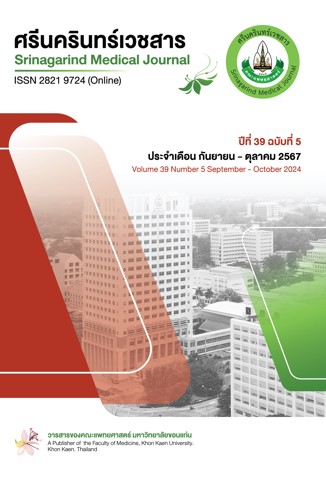The Effectiveness of Individual Counseling Focusing on the Aberrant Motor Behavior Problem of People Living with Dementia
Keywords:
individual counseling, abnormal motor behavior, persons with dementia, emotional, caregiver burdenAbstract
Background and objectives: Aberrant motor behavior (AMB), such as roaming, taking things out , and touching or scratching repetitively is a group of common behavior problems in people with dementia. These symptoms may be annoying, endangered, and burdensome to caregivers. This study aimed to investigate the effectiveness of focused individual counseling for AMB in dementia on burden of caregivers.
Methods: A quasi-experimental, 2-arm, pre-post, interventional study recruited primary caregivers of dementia patients. The active group received a weekly individual counseling for 7 weeks with telephone follow-up for 15 – 40 minutes, and the control group received routine standard care. Data collection included demographic data, the neuropsychiatric inventory (NPI) and the Zarit burden interview (ZBI). Data analyses used descriptive statistics, Wilcoxon signed rank test and Mann-Whitney U test.
Results: From a total of 30 caregivers (n = 15 each group), the AMB severity score, the impact score on emotion from NPI, and the burden score from ZBI at baseline were not significantly different between groups (p > .05). After 7 weeks, the AMB severity score in the intervention group significantly decreased (p < 0.05) compared to the baseline, while both burden score and emotional impact score of the caregivers were not significantly changed (p > 0.05).
Conclusion: Individualized counseling program focused on AMB in dementia demonstrated effectiveness in alleviating of AMB, without significant changes in emotional distress and burden of the caregivers. Further trials with larger sample size and statistical rigorous methods should be conducted to confirm the results.
References
Sutthilak C, Wirojratana V, Puwarawuttipanit W, Cheewakriengkrai L. Factors predicting health status on caregivers of elderly people with dementia. Journal of The Royal Thai Army Nurses 2018; 19(1):171-9.
Cerejeira J, Lagarto L, Mukaetova-Ladinska EB. Behavioral and psychological symptoms of dementia. Front Neurol 2012;3:73. doi:10.3389/fneur.2012.00073.
Penpassakarn P, Jarernrat P, Ananthavornwong N, Thaipisuttikul P. Behavioral variant of frontotmeporal dementia (bvFTD) and developing of mild behavioral impairment (MBI) concept. J Psychiatr Assoc Thai 2019;64 (1):99-112.
Muangpaisan W, Praditsuwan R, Assanasen J, Srinonprasert V, Assantachai P, Intalapaporn S, et al. Caregiver burden and needs of dementia caregivers in Thailand: a cross-sectional study. J Med Assoc Thai 2010;93(5):601-7.
Aphisitphinyo S, Rangseekajee P, Paholpak P, Paholpak P, Warinthorn P. Characteristics of behavioral and psychological symptoms of dementia in patients with major neurocognitive disorder due to vascular disease. J Psychiatr Assoc Thailand 2019;64(4): 371-84.
Kim B, Noh GO, Kim K. Behavioral and psychological symptoms of dementia in patients with Alzheimer’s disease and family caregiver burden: a path analysis. BMC Geriatrics 2021;21(1):160. doi.org/10.1186/s12877-021-02109-w.
Neurological institute of Thailand. Clinical practice guideline of dementia. Bangkok: Tanapress; 2021.
Maneerat S, Maneerat S, Kambunlua T. Psychosocial nursing care for the elderly with behavioral and psychological symptoms of dementia. J Health Sci Res 2018;12(2):1-9.
Lemeshow S, Hosmer DW, Klar J, Lwanga SK. Adequacy of sample size in health studies. New York : John Wiley & Sons; 1990.
Limsakul W, Ngangjui U, Suksoda A. Effects of counseling in caregivers on the ability in activities of daily living of people with dementia and caregivers’ stress. Thai Journal of Nursing 2014;63(4):35-41.
Zarit SH, Reever KE, Back PJ. Relatives of the impaired elderly: correlates of feelings of burden. The Gerontologist 1980;20(6):649-55. doi:10.1093/geront/20.6.649.
Toonsiri Chanandchidadussadee, Sunsern Rachanee, Lawang Wannarat. Development of the burden interview for caregivers of patients with chronic illness. Journal of Nursing and Education 2011;4(1):62-75.
Hemrungrojn S. The NPI-Q Thai. Teaching materials: Practical point in general and neuropsychiatric management of dementia. Bangkok : Chulalongkorn University; 2557.
Iravani B, Abdollahi E, Siahestalkhi FE, Soleimani R. Neuropsychiatric symptoms of alzheimer’s disease and caregiver burden. Front Neurol 2022;13:877143. doi:10.3389/fneur.2022.877143.
Vespa A, Giulietti MV, Ottaviani M, Spatuzzi R, Merico F, Gori G, et al. Evaluation of anxiety and depression in caregivers of patients affected by Alzheimer’ disease. Advances in Alzheimer’s Disease 2015;4:15-20. doi:10.4236/aad.2015.42003.
Okai D, Askey-Jones S, Samuel M, O’Sullivan SS, Chaudhuri KR, Martin A, et al. Trial of CBT for impulse control behaviors affecting Parkinson patients and their caregivers. Neurology 2013;80(9):792–9. doi:10.1212/WNL.0b013e3182840678.
Sanprakhon P. Effectiveness of an interagtive stress reduction program for caregivers of people with advanced dementia: a randomized control trial [dissertation]. Chonburi: faculty of nursing Burapha university; 2021.
Lindeza P, Rodrigues M, Costa j, Guerreiro M, Rosa MM. Impact of dementia on informal care : a systematic review of family caregivers’ perceptions. BMJ Support Palliat Care 2020:bmjspcare-2020-002242. doi: 10.1136/bmjspcare-2020-002242.
Han JW, Jeong H, Park JY, Kim TH, Lee DY, Lee DW, et al. Effects of social supports on burden in caregivers of people with dementia. Int Psychogeriatr 2014;26(10):1639-48. doi:10.1017/S1041610214001331
Alicia BC, Rubl PA, Arnold ATM. Psychometric properties of the Zarit burden interview in informal caregivers of persons with intellectual disabilities. Front Psychol 2022;13:792805. doi:10.3389/fpsyg.2022.792805
Downloads
Published
How to Cite
Issue
Section
License
Copyright (c) 2024 Srinagarind Medical Journal

This work is licensed under a Creative Commons Attribution-NonCommercial-NoDerivatives 4.0 International License.




